Tristan Fry | |
|---|---|
| Birth name | Tristan Frederick Allan Fry |
| Born | 25 October 1946 London, England |
| Occupation | Musician |
| Instrument(s) | Drums, timpani, percussion |
Tristan Frederick Allan Fry (born 25 October 1946, London) is a British drummer and percussionist.
Tristan Fry | |
|---|---|
| Birth name | Tristan Frederick Allan Fry |
| Born | 25 October 1946 London, England |
| Occupation | Musician |
| Instrument(s) | Drums, timpani, percussion |
Tristan Frederick Allan Fry (born 25 October 1946, London) is a British drummer and percussionist.
Fry began his career by joining the London Philharmonic Orchestra as a timpanist at the age of 17. He was a founding member of a number of ensembles, including the Nash, Fires of London and the London Sinfonietta. He also worked as a session musician with various pop and rock artists such as The Beatles, Frank Sinatra, Olivia Newton-John, John Martyn, Elton John, Nick Drake, and David Essex, among others. Fry was percussionist on the Beatles' "A Day In The Life", contributing timpani to the song's two orchestral climaxes. [1] He also played in various other recordings including TV and movie soundtracks, and as Tristan was the timpanist with the Academy of St. Martin in the Fields Orchestra he has performed on many of their recorded works and concerts.
From 1979 - 1995 he was the drummer with the progressive rock group Sky [2] with John Williams, Kevin Peek, Francis Monkman, Herbie Flowers and later Steve Gray when Monkman left to pursue other projects. It was during this period that he attained a reputation as a live drummer, with a revolving double Premier Kit, long drum solos in tracks such as "Hotta" (from the album Sky 2 ), "Meheeco" (from the album Sky 3) and "Son of Hotta" (from the later Cadmium album).
Fry plays with a variety of British orchestras on an ad hoc basis, including playing timpani with the London Chamber Orchestra at the wedding of Prince William and Catherine Middleton in 2011.
All titles released on Ariola records except where noted.
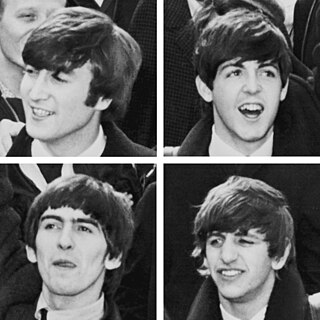
The Beatles were an English rock band formed in Liverpool in 1960. The core lineup of the band comprised John Lennon, Paul McCartney, George Harrison and Ringo Starr. They are widely regarded as the most influential band of all time and were integral to the development of 1960s counterculture and the recognition of popular music as an art form. Rooted in skiffle, beat and 1950s rock 'n' roll, their sound incorporated elements of classical music and traditional pop in innovative ways. The band also explored music styles ranging from folk and Indian music to psychedelia and hard rock. As pioneers in recording, songwriting and artistic presentation, the Beatles revolutionised many aspects of the music industry and were often publicised as leaders of the era's youth and sociocultural movements.

Please Please Me is the debut studio album by the English rock band the Beatles. Produced by George Martin, it was released in the UK on EMI's Parlophone label on 22 March 1963. The album's 14 tracks include cover songs and original material written by the partnership of band members John Lennon and Paul McCartney.
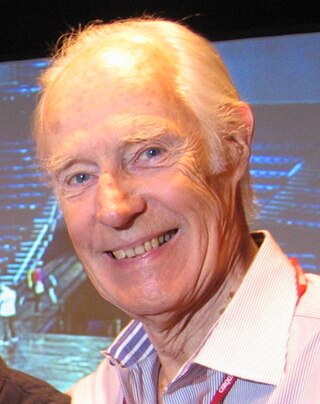
Sir George Henry Martin was an English record producer, arranger, composer, conductor, and musician. He was commonly referred to as the "fifth Beatle" because of his extensive involvement in each of the Beatles' original albums. Martin's formal musical expertise and interest in novel recording practices facilitated the group's rudimentary musical education and desire for new musical sounds to record. Most of their orchestral and string arrangements were written by Martin, and he played piano or keyboards on a number of their records. Their collaborations resulted in popular, highly acclaimed records with innovative sounds, such as the 1967 album Sgt. Pepper's Lonely Hearts Club Band—the first rock album to win a Grammy Award for Album of the Year.

Timpani or kettledrums are musical instruments in the percussion family. A type of drum categorised as a hemispherical drum, they consist of a membrane called a head stretched over a large bowl traditionally made of copper. Thus timpani are an example of kettledrums, also known as vessel drums and semispherical drums, whose body is similar to a section of a sphere whose cut conforms the head. Most modern timpani are pedal timpani and can be tuned quickly and accurately to specific pitches by skilled players through the use of a movable foot-pedal. They are played by striking the head with a specialized beater called a timpani stick or timpani mallet. Timpani evolved from military drums to become a staple of the classical orchestra by the last third of the 18th century. Today, they are used in many types of ensembles, including concert bands, marching bands, orchestras, and even in some rock bands.
William Kraft was an American composer, conductor, teacher, timpanist, and percussionist.
Sky were an English–Australian instrumental rock group that specialised in combining a variety of musical styles, most prominently rock, classical and jazz. The group's original and best-known line-up featured two Australians - classical guitarist John Williams and electric guitarist Kevin Peek - alongside three Britons - bass player Herbie Flowers, drummer/percussionist Tristan Fry and keyboard player Francis Monkman.

The Complete Beatles Recording Sessions is a 1988 reference book on the English rock band the Beatles written by Mark Lewisohn. It was published by Hamlyn in the UK and by Harmony Books in the US.
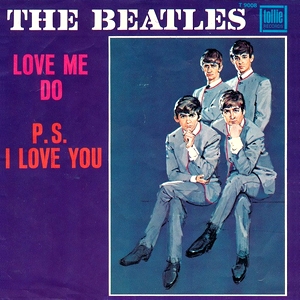
"Love Me Do" is the debut single by the English rock band the Beatles, backed by "P.S. I Love You". When the single was originally released in the United Kingdom on 5 October 1962, it peaked at number 17. It was released in the United States in 1964 and topped the nation's song chart. Re-released in 1982 as part of EMI's Beatles 20th anniversary, it re-entered the UK charts and peaked at number 4. "Love Me Do" also topped the charts in Australia and New Zealand.
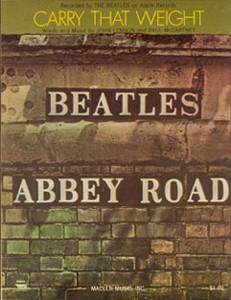
"Carry That Weight" is a song by the English rock band the Beatles from their 1969 album Abbey Road. Written by Paul McCartney and credited to Lennon–McCartney, it is the seventh and penultimate song in the album's climactic side-two medley. It features unison vocals in the chorus from all four Beatles, a rarity in their songs. It is preceded by "Golden Slumbers" and segues into "The End".

"Don't Pass Me By" is a song by the English rock band the Beatles from their 1968 double album The Beatles. A country rock song, it was the first solo composition written by drummer Ringo Starr.

"P.S. I Love You" is a song recorded by English rock band the Beatles in 1962. It was composed principally by Paul McCartney, and produced by Ron Richards. The song was released in the UK on 5 October 1962 as the B-side of their debut single "Love Me Do" and is also included on their debut album Please Please Me (1963). It was later included on the American release Introducing... The Beatles (1964), its reissue The Early Beatles (1965), and the Beatles compilation album Love Songs (1977).
Anthony Francis Keigwin Monkman was an English rock, classical and film score composer, and a founding member of both the progressive rock band Curved Air and the classical/rock fusion band Sky.
"You Know What to Do" was the second song written and recorded by George Harrison with the Beatles. It was recorded on 3 June 1964 but remained unreleased until its inclusion on the band's 1995 outtakes compilation Anthology 1.
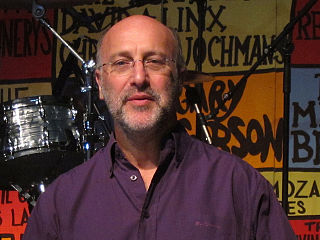
Mark Lewisohn is an English historian and biographer. Since the 1980s, he has written many reference books about the Beatles and has worked for EMI, MPL Communications and Apple Corps. He has been referred to as the world's leading authority on the band. His major works include The Complete Beatles Recording Sessions (1988), a history of the group's session dates, and The Beatles: All These Years (2013–present), a three-volume series intended as the group's most comprehensive biography.

"Christmas Time (Is Here Again)" is a Christmas song by the English rock band the Beatles, originally recorded for their fifth fan club Christmas record, Christmas Time Is Here Again! (1967). One of the few Beatles songs credited to all four members of the band, it consists of a blues based backing track as well as double-tracked vocals sung by them, George Martin and Victor Spinetti. The lyrics are mostly made up of the song's title refrain, repeated across nine verses.

"Ain't She Sweet" is a song composed by Milton Ager, with lyrics by Jack Yellen. It was published in 1927 by Ager, Yellen & Bornstein, Inc. It became popular in the first half of the 20th century and typified the Roaring Twenties. Like "Happy Days Are Here Again" (1929), it became a Tin Pan Alley standard. Both Ager and Yellen were elected to the Songwriters Hall of Fame.

"Golden Slumbers" is a song by the English rock band the Beatles from their 1969 album Abbey Road. Written by Paul McCartney and credited to Lennon–McCartney, it is the sixth song of the album's climactic B-side medley. The song is followed by "Carry That Weight" and begins the progression that leads to the end of the album. The two songs were recorded together as a single piece, and both contain strings and brass arranged and scored by producer George Martin.
Kevin Peek was an Australian guitarist, playing both rock and classical music, best known for his work with the progressive rock band Sky.

Cadmium is the sixth album by the progressive-classical rock band Sky, released in November 1983. The album contents were a mixture of Sky traditions and new elements – it contained a classical-rock arrangement of Prokofiev's "Sleigh Ride", alongside seven original compositions and the first examples of commissioned compositions from contemporary writers from outside the band. The colour of the album cover is primarily cadmium yellow, a pigment used by painters.